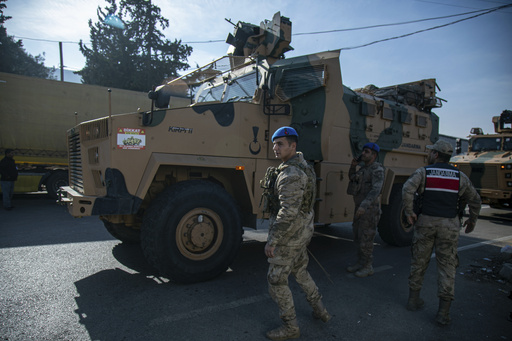
CILVEGOZU BORDER CROSSING, Turkey — On Monday, a large number of Syrian refugees gathered at two border points in southern Turkey, filled with excitement at the prospect of returning to their homeland after the recent fall of Bashar Assad’s regime.
Many of these individuals arrived at the Cilvegozu and Oncupinar crossings early in the morning, bundled in blankets and coats against the chill. Some set up camp near the barriers, tending to small fires to keep warm. These crossings correspond to the Bab al-Hawa and Bab al-Salameh gates located on the Syrian side of the border.
Among the crowd at Cilvegozu was Muhammed Zin, a 28-year-old who fled Damascus in 2016 and has since been living in Istanbul. “Assad was shooting us, killing us,” Zin expressed as he shared his relief. “I will return to Syria now. Thank God, the war is over.”
The news of Assad’s downfall has ignited widespread celebrations among Syria’s 3 million refugees in Turkey, with many taking to the streets in cities like Istanbul. Recently, protesters removed the Syrian government’s flag from the consulate in Istanbul and replaced it with the flag of the opposition.
At the Oncupinar border gate, Mustafa Sultan, 29, expressed his intention to cross into Syria to search for his older brother, who has been imprisoned in Damascus during Assad’s rule. “I haven’t seen him for 13 years. The prisons have been emptied, so I’m going to see whether he’s alive,” Sultan said, filled with hope.
Though Turkish officials have not disclosed how many Syrians have returned since the regime’s collapse, President Recep Tayyip Erdogan stated he expects the numbers to rise as stability returns to Syria. Erdogan also announced plans to reopen a third border crossing to alleviate congestion at current gates.
“As Syria gains more stability, God willing, voluntary, safe, and honorable returns will increase,” Erdogan declared during a televised address following a Cabinet meeting.
Initially, Turkey opened its doors to Syrian refugees in the early stages of the civil war that began in 2011, becoming home to the largest number of refugees worldwide. Turkish officials had expected a quick resolution to the conflict, believing that the refugee situation would be temporary.
However, as economic conditions in Turkey became strained, public sentiment towards the refugees shifted negatively, prompting the government to explore means for their safe and voluntary repatriation. Turkish authorities now hope to see a substantial number of refugees returning home of their own volition.
“We will continue our efforts to ensure the safe and voluntary return of Syrians and to rebuild the country,” said Turkish Foreign Minister Hakan Fidan on Monday.
Refugees at Cilvegozu were seen wheeling suitcases and carrying personal belongings in sacks. Authorities set up a checkpoint about 5 kilometers (3 miles) away, allowing entry only to those with appropriate documents, as reported by local media.
Zakariya Mori al-Shami, a 31-year-old who had sought refuge in Turkey since 2019, awaited the chance to cross back into Syria with his wife and two children. He expresses a desire to rebuild their home in Aleppo, which had been destroyed during the fighting.
Eager to reunite with his family in Damascus, Mohammed al Muhbuhar, 27, mentioned that he rushed to the border “immediately” after hearing of Assad’s departure. “There is no more torture. God willing, Syria will be better,” he stated with optimism.
Additionally, hundreds of displaced Syrians returned from Lebanon on the same day. Sami Abdel-Latif, a construction worker from Hama, conveyed his aspirations to join his wife and children in Syria. “The future in Syria is uncertain, but anything is better than Bashar,” he remarked, acknowledging the chaos expected initially but held onto hope for normalization over time.
“Look at Aleppo now,” Abdel-Latif pointed out, referencing the first major city seized by opposition forces over a week ago, where daily life has gradually returned to normal.
Malak Matar, preparing for his re-entry to Damascus, shared, “You feel psychologically free — you can express yourself,” emphasizing that people had yearned for this freedom for 14 long years. He added, “Now, Syrians have to create a state that is well organized and cares for their country. It’s a new phase.”

